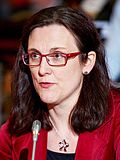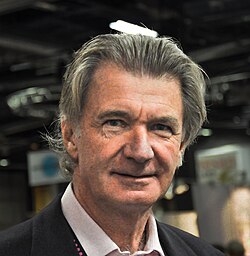| | First party | Second party | Third party |
|---|
| | |  | | | Leader | Inger Segelström | Gunnar Hökmark | Nils Lundgren |
|---|
| Party | Social Democrats | Moderate | June List |
|---|
| Alliance | PES | EPP | EUD |
|---|
| Last election | 6 seats, 25.99% | 5 seats, 20.75% | new |
|---|
| Seats won | 5 | 4 | 3 |
|---|
| Seat change |  1 1 |  1 1 |  3 3 |
|---|
| Popular vote | 616,963 | 458,398 | 363,472 |
|---|
| Percentage | 24.56% | 18.25% | 14.47% |
|---|
| Swing |  1.43% 1.43% |  2.50% 2.50% | new |
|---|
| | | Fourth party | Fifth party | Sixth party |
|---|
| |  |  |  | | Leader | Jonas Sjöstedt | Cecilia Malmström | Lena Ek |
|---|
| Party | Left | Liberals | Centre |
|---|
| Alliance | NGLA | ALDE | ALDE |
|---|
| Last election | 3 seats, 15.82% | 3 seats, 13.85% | 1 seat, 5.99% |
|---|
| Seats won | 2 | 2 | 1 |
|---|
| Seat change |  1 1 |  1 1 |  0 0 |
|---|
| Popular vote | 321,344 | 247,750 | 157,258 |
|---|
| Percentage | 12.79% | 9.86% | 6.26% |
|---|
| Swing |  3.03% 3.03% |  3.99% 3.99% |  0.27% 0.27% |
|---|
| | | Seventh party | Eighth party |
|---|
| |  |  | | Leader | Carl Schlyter | Anders Wijkman |
|---|
| Party | Green | Christian Democrats |
|---|
| Alliance | Greens/EFA | EPP |
|---|
| Last election | 2 seats, 9.49% | 2 seats, 7.64% |
|---|
| Seats won | 1 | 1 |
|---|
| Seat change |  1 1 |  1 1 |
|---|
| Popular vote | 149,603 | 142,704 |
|---|
| Percentage | 5.96% | 5.68% |
|---|
| Swing |  3.53% 3.53% |  1.96% 1.96% |
|---|
|








